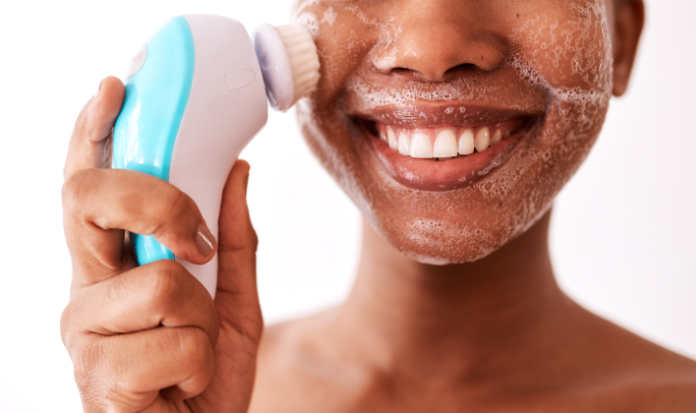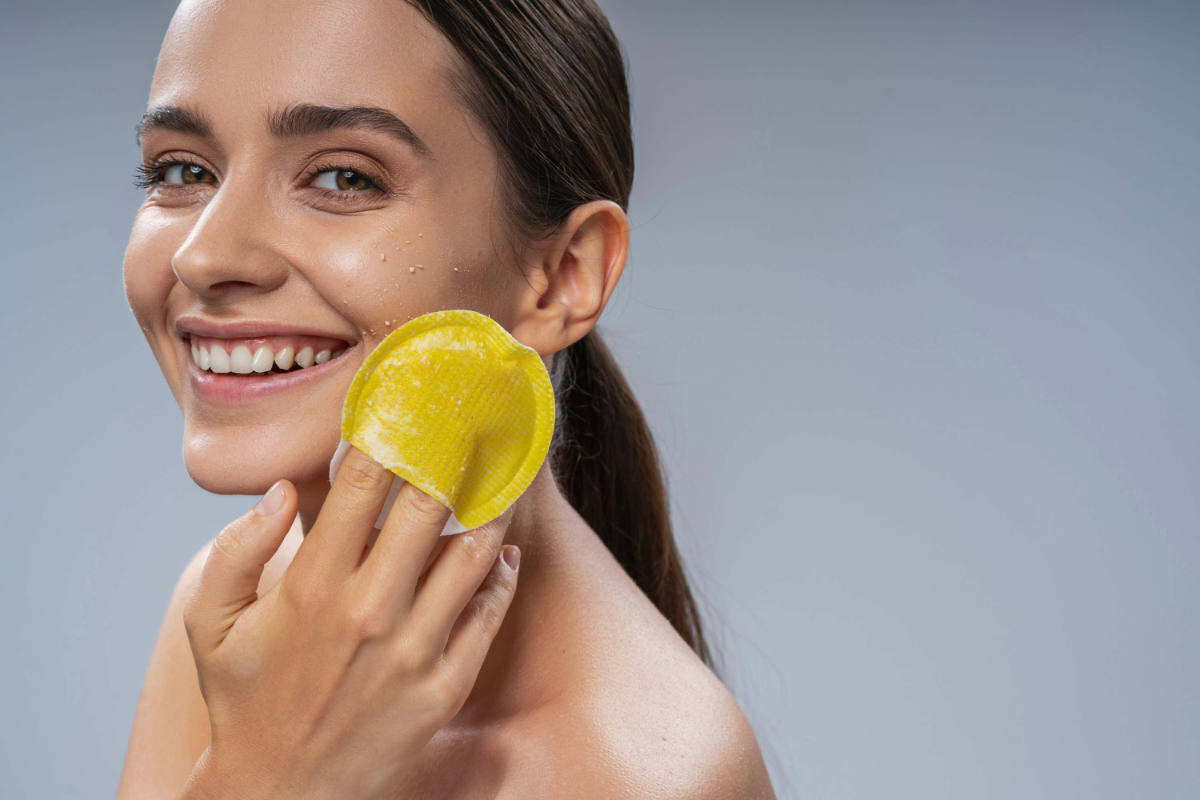Ever since Gen-Z skincare guru Hyram Yarbro said that “face scrubs in general are trash” in a TikTok video last year, we’ve had a lot of unanswered questions about exfoliating.
The process – which generally involves using a granular substance to slough away dead skin cells – promises to improve skin clarity, texture and even help with issues like acne.
But is exfoliating worth the effort, and how often should you actually be including it in your pamper sessions? We put the question to skin experts and dermatologists. Here’s what they had to say…
Is exfoliating good for the skin?

“Exfoliating helps to remove dead skin cells from the outer layer of your skin and should be a key part of your skin care regime,” assures Dr Ross Perry medical director of Cosmedics skin clinics.
“It’s important to exfoliate the skin because, as we age, our skin’s natural ability to shed skin cells slows down – which can lead to dull, flaky and congested looking skin.”
Cleansing won’t do quite the same job as an exfoliator and, as Perry notes: “The dead skin cells left on the skin can inhibit other products working, so regular exfoliating gives the skin a good base for make-up.”
There are two types of exfoliators that can work with the skin. “Mechanical exfoliation involves physically scrubbing your skin’s surface with a scrub, dry brush, or another exfoliating skin care tool,” says Perry.
“Chemical exfoliation, meanwhile, involves the use of salicylic acid, alpha-hydroxy acids or enzymes to chemically break down surface build-up.” Products formulated with these exfoliating ingredients are often liquid exfoliators, but they can also be included in the formulas of face creams and cleansers.
View this post on Instagram
How often should you exfoliate?
It all depends on your skin type. “Some people can handle exfoliating the skin every two to three days, and for others it’s more a case of just once a week,” says Perry. “It’s important to see how your skin reacts to exfoliating the first time and go from there.”
Chemical exfoliators and exfoliating acids “work really well” to get rid of dead skin cells without overly scrubbing the skin, according to Perry, who has a couple of standout ingredients.
“Alpha-hydroxy acids (AHA’s) will help to smooth the skin and unclog blocked pores, while BHA’s (beta-hydroxy acids) help to reduce breakouts, control excess oil on the skin and help with inflammation.”
I think I’m obsessed with exfoliating my face 🙃 atleast it’s a good obsession to have 😂
— 𝑺𝒕𝒆𝒑𝒉𝒂𝒏𝒊𝒆 𝑫𝒆 𝑳𝒂 𝑪𝒓𝒖𝒛 ❁ (@Stephaniee_DLC) March 8, 2020
He continues: “For acne-prone skin, look for an exfoliator containing salicylic acid as it helps to penetrate deep into the skin’s surface. If you’ve got sensitive skin, look for products containing fruit extracts such as pumpkin, papaya and pineapple, as these products help to break down dead skin cells without causing irritation.”
Can over exfoliating be bad for the skin?
In a word, yes. “It’s important to judge your skin type when exfoliating,” says Perry.
“Scrubbing too hard can damage the outer layer of the skin and people with sensitive skin can actually cause further breakouts if they’re exfoliating too frequently.”
For oily skin, you can get away with exfoliating two to three times a week to keep skin healthy looking, says Perry, but for those who have dry skin and tight feeling skin, exfoliating isn’t recommended more than once or twice: “That’s because this skin type tends to be lacking in natural oils, so it isn’t necessary.”
Rocking combination skin? “Two or three times a week is perfectly fine, but you might want to focus more on the areas of the face which are more oily,” says Perry.
Is exfoliating different from dermaplaning?
“Dermaplaning is a pain-free method of removing dead skin cells and unwanted facial hair at the same time,” says Sara Waterman, senior aesthetician at Young LDN.
View this post on Instagram
Unlike at-home exfoliating, it must be performed by a trained aesthetician, as dermaplaning involves using an exfoliating blade to gently scrape dead cells and hair.
Many people anecdotally say that it’s a far less invasive than a chemical peel, but creates the same smooth and even-toned results. If you have acne or cold sores though, dermaplaning probably isn’t for you, as Waterman says it can spread bacteria and cause further inflammation of the skin.
Any do’s and don’ts with exfoliating?
“Only exfoliate the skin at night,” says Perry. “This is because you’re essentially taking off the top layer of skin so you might feel a little sensitive. You’re also more susceptible to sun damage if you exfoliate during the day, so it’s important to allow the skin to repair itself overnight.”
You should always wear sunscreen too, and not just on sunny days either. “This is a given year round, but skin will always be more prone to UV and environmental damage for a few days after exfoliating.”
It’s easy to overdo exfoliating, because it feels so great to wash away any unwanted debris, but Perry says you should always listen to your skin and make sure you’re opting for the right ingredients.
“Don’t immediately rinse off a chemical exfoliator as it needs time to do its job and dissolve the dead skin cells,” he adds. “Try to wait at least 15 mins before gently rinsing it off.
“You should also look for products containing alpha hydroxy acids, which are best for dry and sun-damaged skin, and appear under the ingredients glycolic acid and lactic acid.”
He concludes: “For acne-prone and oily skin opt for beta hydroxy acids, which are found in products that list salicylic acid as a main ingredient.”
Best-selling gentle facial exfoliating creams
Stuck for inspiration? Check out our list of best-selling Amazon products!
No products found.
You may be interested in…
This article may include affiliate links to products and services where we may receive a small fee to support the running of this site if you make a purchase or is a sponsored article from one of our select editorial partners providing valuable advice and information to our readers.































































